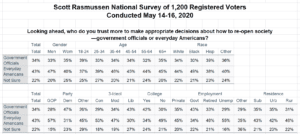When it comes to making decisions about re-opening, just 34 percent of voters trust government officials more than everyday Americans. Let’s face it, it’s hard to have confidence in government decision-making when decisions about which businesses can open seem either irrational or blatantly political. That’s one reason why more voters—43 percent—place their trust in the general public.
On the core issue of who do you trust, upper-income Americans, government employees, college graduates and Democrats alike are all more comfortable with the government making sweeping decisions. The reverse is true for lower- and middle-income Americans, private sector workers, retirees, those without a college degree, Republicans and independents.
Other recent data shows that 41% of voters believe shutting down businesses and locking down society did more harm than good. Additionally, 52% agree with Ronald Reagan’s assessment: the nine most terrifying words in the English language are “I’m from the government and I’m here to help.” Those words continue to resonate with many Americans.
The implications of these findings were addressed in a Newsweek column by Scott Rasmussen. “Despite the fact that the public is anxious to re-open society, several Democratic governors are desperately clinging to their lockdown policies. Their efforts could help ensure the re-election of Donald Trump.”
SIGN UP to receive Scott’s free email newsletter.
CHECK OUT Scott’s latest polls.
The survey of 1,200 Registered Voters was conducted by Scott Rasmussen using a mixed mode approach from May 14-16, 2020. Field work for the survey was conducted by RMG Research, Inc. Most respondents were contacted online or by text while 238 were contacted using automated phone polling techniques. Certain quotas were applied, and the overall sample was lightly weighted by geography, gender, age, race, education, and political party to reasonably reflect the nation’s population of Registered Voters. Other variables were reviewed to ensure that the final sample is representative of that population.



